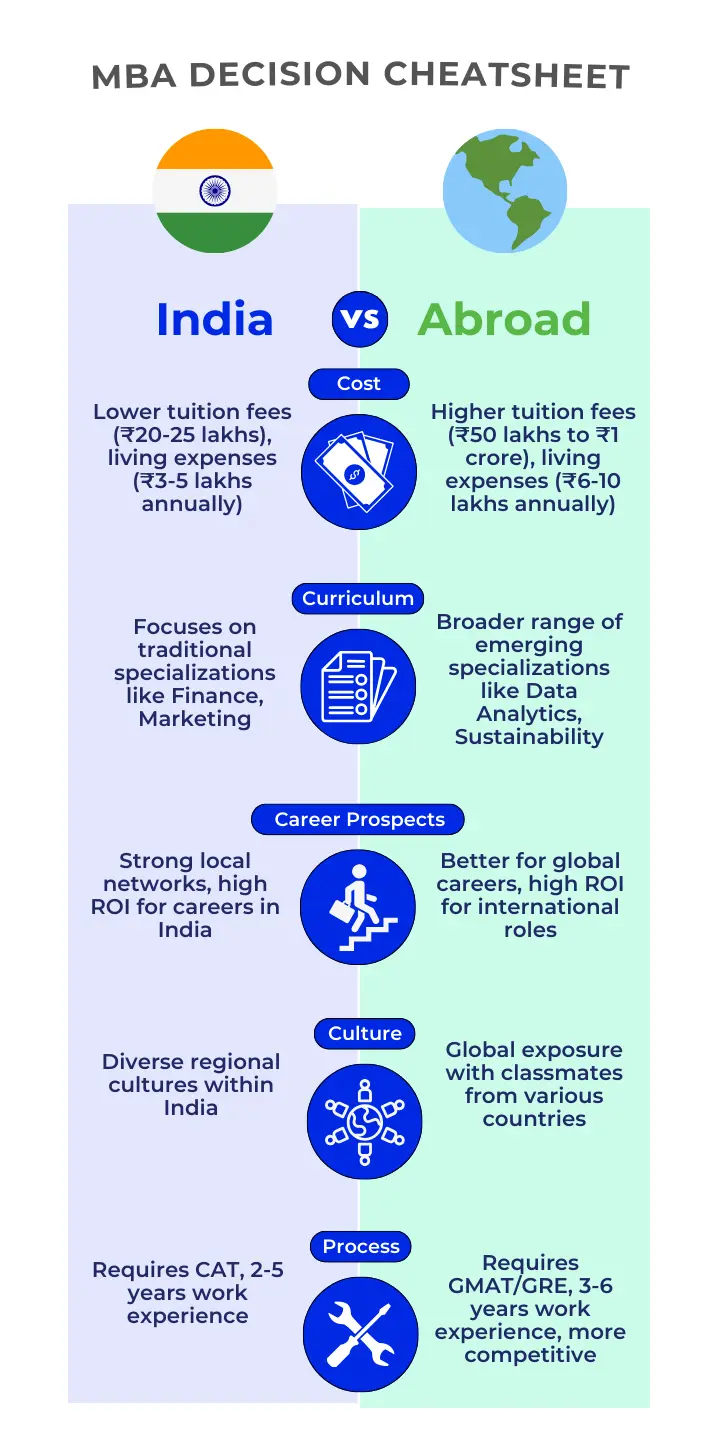Picture this…
You’re at a crossroads in your career. You know an MBA can skyrocket your professional growth, but here’s the million-dollar question:
Which one should you consider: an MBA in India vs MBA abroad?
It’s a tough call, right?
If it makes you feel any better, you’re not alone in this dilemma. Every year, thousands of ambitious professionals like you struggle with this decision.
But here’s the good news: the right choice for you depends on a number of factors unique to your situation.
In this comprehensive guide, we’re going to dive deep and help you figure out which one’s right for you – An MBA from India or an International MBA.
We’ll analyze SIX crucial factors that’ll help you make an informed decision. No fluff, no bias – just the hard-hitting facts you need.
Here’s what we’ll cover:
- The real cost of an MBA in India vs MBA abroad
- The curriculum and the specializations you can take up
- The job market dynamics and the career prospects
- The application process and admission requirements
- Cultural experience that could reshape your worldview
- MBA in India vs MBA Abroad: Frequently Asked Questions
By the time you finish reading, you’ll have crystal-clear insights to guide your decision.
Whether you’re eyeing the prestigious IIMs or dreaming of Harvard Business School, we’ve got you covered.
Let’s get right into it and supercharge your career decision!
Grab your free copy of ‘Top 50 Profiles Who Cracked MBA with Crackverbal’
Grab your free copy of ‘Top 50 Profiles Who Cracked MBA with Crackverbal’
1. MBA in India vs MBA Abroad: Cost Comparison
Let’s talk about money. Because when it comes to choosing between an MBA in India vs MBA abroad, your wallet has the final say.
Let’s talk about…
A. Full Cost Breakdown – Tuition, Living & Hidden Costs
B. MBA ROI: Which MBA Pays You Back Faster?
C. Scholarships, Loans & Funding Options: MBA in India and MBA Abroad
A. Full Cost Breakdown – Tuition, Living & Hidden Costs
Sure, tuition fees are the headline act. But there’s a whole backstage crew of expenses you need to know about:
| Aspect | Indian MBA | Foreign MBA |
|---|---|---|
| Tuition Fees | Top B-schools like IIMs can have tuition fees as high as ₹20-25 lakhs. | Hold on to your hats! The tuition fees in a foreign institute can start at ₹50 lakhs and go up to more than ₹1 crore! |
| Living Expenses | If you include rent, food, travel, (and an occasional movie or party), you could end up spending ₹3-5 lakhs annually. | Go right ahead and double or triple that, depending on the city. That's anywhere between (or more than) ₹6-10 lakhs annually. Yup! Life abroad is super expensive! |
Most people only consider the first two points when they think of MBA-related expenses.
There are several sneaky expenses that can totally blindside you. We’re talking about:
- Visa and travel costs (for studying abroad)
- Health insurance (a big-ticket item in countries like the US)
- Networking events (You won’t believe the money you’ll end up spending on coffee meets!)
- Club memberships (crucial for your MBA experience)
- Study materials and technology
B. MBA ROI: Which MBA Pays You Back Faster?
Here’s where it gets interesting. Let’s unpack this!
Short-term impact
- Brace yourself for a financial hit. In both cases, you’re looking at 1-2 years of expenses with no income.
PS: Indian students opting for an International MBA often face higher tuition rates and living expenses compared to domestic students. - You’ll feel the “MBA magic” only in the long term.
| Aspect | Indian MBA | International MBA |
|---|---|---|
| Long-term payoff |
|
|
| Salary Expectations |
|
|
Looks like the monetary ROI for both is pretty much the same for both, right? But there’s more to an MBA than just money!
In the end what matters is what is your career goal and where do you want to build your network.
If you’re aiming for a global career, especially in top markets like the US, an international MBA is your best bet. These programs offer unmatched global exposure and networking opportunities.
But, if you’re planning to work in India or the US, an Indian MBA is a solid choice. They offer great ROI, strong local networks, and excellent brand recognition.
C. Scholarships, Loans & Funding Options: MBA in India and MBA Abroad
Don’t let the costs scare you off. There are ways to make it work:
Loans
Both Indian banks and international institutions offer education loans.
Pro tip: Check out government schemes like the Vidya Lakshmi Portal for Indian students.
Financial Aid
Many B-schools offer need-based financial aid. It’s not just for the straight-A crowd!
Scholarships
We’re talking free money, folks!
Here’s a list of scholarships for Indian students:
- Domestic Scholarships:
- AICTE
- State government scholarships
- International Scholarships:
- Fulbright
- Chevening
- University-specific scholarships
The key is to calculate your personal ROI. Crunch those numbers, and let your career aspirations guide your decision.
Next up: It’s a curriculum battle! Indian specializations vs international offerings – who will emerge victorious? Let’s check it out!!
2. MBA in India vs MBA Abroad: Curriculum & Course Structures
Ready to make your MBA work for you? The right curriculum and specializations can be major level-ups.
You may be leaning towards an Indian MBA or an international one. Either way, understanding what each offers is crucial.
Let’s talk about…
A. MBA Specializations: India vs Abroad
B. Industry relevance of curriculum
C. Faculty expertise and teaching methodology
A. MBA Specializations: India vs Abroad
When it comes to choosing between an MBA in India vs MBA abroad, the range of specializations can be the real deal. Here’s a quick comparison to help you decide:
| Aspect | Indian MBA | Foreign MBA |
|---|---|---|
| Specializations |
|
|
B. Industry relevance of curriculum: Keeping it eal!
When it comes to keeping up with global business trends, the curriculum is key. Here’s how Indian and international MBA programs stack up:
| Aspect | Indian MBA | Foreign MBA |
|---|---|---|
| Curriculum Relevance |
|
|
C. Faculty expertise and teaching methodologies: Learn from the Legends!
The expertise of the faculty and the teaching methodologies they employ can significantly impact your MBA experience. Here’s how Indian and international MBA programs stack up:
| Aspect | Indian MBA | Foreign MBA |
|---|---|---|
| Faculty Expertise |
|
|
| Teaching Methodologies |
|
|
| Faculty |
|
|
In the end, it’s all about aligning the program with your career goals. It’s not just about the content but how you absorb it. Find the right fit that offers both the knowledge and the learning style that matches your professional aspirations.
Up next: We’ll analyze career prospects. Because let’s face it, you’re not just here for the knowledge – you’re here for the success that follows. Stay tuned!
Grab your free copy of ‘Top 50 Profiles Who Cracked MBA with Crackverbal’
Grab your free copy of ‘Top 50 Profiles Who Cracked MBA with Crackverbal’
2. MBA in India vs Abroad: Career Opportunities
Let’s get down to brass tacks. You’re not just after a degree – you’re after a career that’s so good that it’’ll make your LinkedIn profile pop!
So, how do Indian and foreign MBAs stack up in the job market? Let’s find out.
A. MBA Job Market Trends: Indian vs Abroad
First things first – let’s talk numbers:
| Aspect | Indian MBA | International MBA |
|---|---|---|
| Placement rates | Top Indian B-schools boast near 100% placement rates. | Foreign MBAs are not far behind, but the competition is fierce. |
| Salary Packages | Average starting salaries range from ₹20-25 lakhs annually. | We're talking ₹50 lakhs to ₹1 crore annually. |
| Market Dynamics | Indian MBAs have their finger on the pulse of the booming Indian economy. That's gold for companies expanding in India. | Foreign MBAs often have an edge in multinational corporations. They speak the language of global business. |
Industry Preferences
- Tech giants? Doesn’t matter if your MBA is from India or abroad. They love both.
- Consulting firms? Slight preference for foreign MBAs.
- Indian conglomerates? Home advantage to Indian MBAs.
B. Networking Power: Alumni and Industry Connections
Your network is your net worth. Here’s how it breaks down:
| Aspect | Indian MBA | International MBA |
|---|---|---|
| Alumni Network Strength | Top Indian B-schools offer strong local networks. Think CEOs of top Indian companies. | Foreign MBAs offer global networks. We're talking Fortune 500 bigwigs. |
| Networking Opportunities | These programs give you a front-row seat to industry conclaves, business summits, and alumni meets. | These programs open doors to international job fairs, global alumni meetups, and a variety of peer groups. |
Pro tip: It’s not just about collecting business cards. It’s about building relationships that’ll catapult your career.
C. Startups & Entrepreneurship Pathways
Got a billion-dollar idea? Here’s how your MBA choice could fuel your startup dreams:
| Aspect | Indian MBA | International MBA |
|---|---|---|
| Startup Support |
|
|
| Incubator Programs |
|
|
| Funding Access | Indian MBA programs' strong ties to local venture capitalists make it easier to access funding for startups. | Foreign MBA programs provide broader access to international funding sources. |
Choosing an MBA in India vs MBA abroad is just the start.
The real game-changer? How you leverage the opportunities, networks, and knowledge you score along the way.
Next up: We’ll break down the application process. Because before you can rock the business world, you’ve got to nail that admission. Stay tuned!
4. MBA Admission Process: India vs Abroad
Alright, future MBA superstars, it’s time to talk about the elephant in the room: getting into your dream B-school.
Whether you’re eyeing an Indian B-school or dreaming of an international campus, the application process can feel like a marathon.
No worries! We’ve got this!
Let’s look at…
A. Entrance Exams (GMAT, GRE, CAT)
B. Importance of Work Experience & Extracurriculars
C. Admission Timelines: When to Apply for MBA in India or Abroad
D. Application Components: Essays, LORs, SOPs & More
A. Entrance Exams (GMAT, GRE, CAT)
First up, the numbers game:
| Aspect | Indian MBA | International MBA |
|---|---|---|
| GMAT vs GRE |
|
|
| Score expectations |
|
|
Pro Tip: Scores matter, but they’re not everything. A 715+ won’t guarantee admission, and a 625 won’t necessarily sink you.
B. Importance of Work Experience & Extracurriculars
Here’s where you show you’re not just a bookworm:
Work Experience
- Indian MBAs: 2-5 years is the sweet spot.
- Foreign MBAs: 3-6 years often preferred.
Quality trumps quantity. One year of high-impact work beats three years of coffee-fetching.
Extracurriculars
No matter where you choose to get your MBA from, you need to show your aptitude in…
- Leadership roles
- Community service
- Entrepreneurial ventures
Show them you can lead, innovate, and make a difference. That’s MBA gold!
C. Admission Timelines: When to Apply for MBA in India or Abroad
Mark your calendars, folks!
| Aspect | Indian MBA | International MBA |
|---|---|---|
| Deadlines |
|
|
Pro Tip: Apply in earlier rounds for better scholarship chances!
D. Application Components: Essays, LORs, SOPs & More
Here’s what you’ll need to dazzle the admissions committee:
- Essays
This is your chance to shine. Be authentic, specific, and compelling. - Recommendations
Choose advisors who know your work well. - Resume
Highlight impacts, not just responsibilities. - Interviews
Be prepared to defend every line on your resume.
Admissions teams for MBAs in India and abroad are on the lookout for future leaders. Show them that’s you!
Up next: We’ll explore the cultural experience. MBA isn’t just about books – it’s about broadening your horizons.
Grab your free copy of ‘Top 50 Profiles Who Cracked MBA with Crackverbal’
Grab your free copy of ‘Top 50 Profiles Who Cracked MBA with Crackverbal’
5. MBA in India vs Abroad: Cultural Experience
Alright, future global leaders, let’s talk about the secret sauce of an MBA – the stuff that doesn’t show up on your transcript but can change your life.
A. Diversity in the Classroom: A World in Your Lecture Hall
Whether you’re considering an MBA in India vs MBA abroad, the cultural experience of being in a class of MBA students is truly invaluable.
| Aspect | Indian MBA | Foreign MBA |
|---|---|---|
| Cultural Experience |
|
|
Pro Tip: Diversity isn’t just about different passports. It’s about different perspectives. Embrace it!
Keep in mind that adaptability is your business superpower. An MBA is your golden ticket to mastering it.
B. MBA from India vs MBA Abroad: Work Visa Policiesg
Post-MBA work opportunities can vary wildly depending on where you study.
Let’s check out the details…
| Aspect | Indian MBA | Foreign MBA |
|---|---|---|
| Work Visa |
|
|
| Long-term prospects | You're at the heart of a booming economy. Opportunities? Endless. | Prospects can be bright, but navigating visa regulations is part of the game. |
| Career Implications | The powerhouse network in India is booming and is now globally recognized. | Yes, there's a global network at your fingertips, but it might need extra effort to break into the Indian market. |
The Bottom Line: Whether in India or abroad, an MBA is a transformative experience. It’s not just about the degree – it’s about who you become in the process.
Up next: We’re diving into alternative MBA formats. Because in 2024, your MBA doesn’t have to mean two years in a classroom.
Stay tuned for the lowdown on part-time, executive, and online options!
6. Alternative MBA Formats: Flexibility in Education
Alright! Let’s talk about the elephant in the room – not everyone can put their life on pause for two years.
But guess what? You don’t have to!
Welcome to the world of alternative MBA formats!
A. Part-time and Executive MBAs
| Aspect | Indian MBA | Foreign MBA |
|---|---|---|
| Part-time MBAs |
|
|
| Executive MBAs |
|
|
The big advantage of these alternatives is that you get to keep your job, your salary, and gain an MBA.
But, you’ll have to say goodbye to free weekends for a while. Small price to pay, we say!
B. Online and Hybrid MBA Programs
| Aspect | Indian MBA | Foreign MBA |
|---|---|---|
| Online MBAs |
|
|
| Hybrid Programs |
|
|
Few things to keep in mind:
- Choose courses with the best accreditations (AACSB, EQUIS, AMBA).
- Check employment reports. Good programs provide solid career outcomes.
- Look out for programs that bring in tech and innovation in their curriculum. Virtual reality classrooms! AI-powered personalized learning paths! The future is changing as we speak!
Up Next: We’re wrapping this all up.
All set for a decision-making framework that’ll help you choose between an MBA in India vs MBA abroad.
Let’s head right for the grand finale!
7. MBA in India vs MBA Abroad: Which One to Choose?
Wow! That’s quite a journey we’ve just been on!
From crunching numbers while discussing tuition to exploring the cultural melting pots of B-schools, we’ve covered it all.
Now, it’s decision time.
But don’t worry – we’re not leaving you hanging. Let’s wrap this up with a bow and give you a roadmap to making your choice between an MBA in India vs MBA abroad.
MBA in India vs MBA Abroad: Pros & Cons Explained
- Costs: Indian MBAs are generally cheaper, but foreign MBAs often offer higher ROI.
- Curriculum: Both offer quality, but foreign MBAs might have an edge in cutting-edge specializations.
- Career Prospects: Indian MBAs for local powerhouses and foreign MBAs for global giants.
- Cultural Experience: Diversity in India and global exposure abroad.
- Application Process: There’s tough competition everywhere, but standout applications always win.
- Alternative Formats: Part-time, executive, and online options available both in India and abroad.

It’s Not a One-Size-Fits-All deal!
Let’s be honest! There’s no universal “better” choice.
The best MBA for you depends on YOUR goals.
Ask yourself:
- Where do you see yourself in 10 years?
- Which industries excite you?
- Are you ready for a global move, or is India where you want to shine?
Your Next Steps: Beyond This Article
- Deep Dive: Research specific programs that catch your eye.
- Reach Out: Connect with alumni. Their insights are gold.
- Crunch Numbers: Calculate your personal ROI for different options.
- Soul Search: Reflect on your long-term career vision. Align your choice with that.
- Visit, if Possible: Nothing beats experiencing the campus vibe firsthand.
The Final Word
You’re not just choosing a school; you’re choosing a launchpad for your future. So take your time, do your homework, and trust your gut.
Remember, the best MBA program is the one that aligns with YOUR goals, YOUR aspirations, and YOUR vision for the future.
Now, go out there and conquer the business world! Whether it’s from Mumbai or Manhattan, your MBA journey is about to take off.
Buckle up – it’s going to be one heck of a ride!
P.S. Didn’t find all your answers here? Check out our FAQ section below for more in-depth info on MBA rankings, alumni networks, and financial planning tools. Your MBA journey starts now!




0 Comments